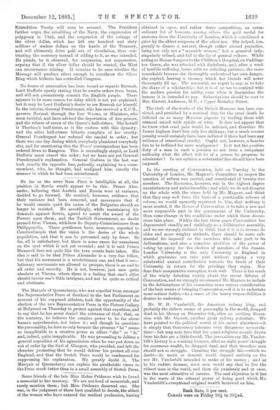In the meeting of Convocation, held on Tuesday in the
'University of London, Mr. Magnus's Committee to reopen the question of reform was carried, and constituted of twenty-five members. The discussion, however, was in the highest degree unsatisfactory and unbusines.slike ; and while we do not disagree on the whole with the views held by Mr. Magnus, and think that they may well form the basis of a practicable scheme of reform, we would earnestly represent to him, that nothing is more needed, if the House of Convocation is to take a new and more responsible part in the government of the University, than some change in the conditions under which these discus- sions take place. Within the last three years Convocation has degenerated steadily and strikingly as a deliberative assembly, and we are strongly inclined to think that if it is to resume its older and more weighty attitude, there should be some sub- stantial fee imposed on the members who take part in its deliberations, and also a 'complete abolition of the power of voting by proxy for the election of members of the Senate. London University is the only University in England in which graduates can take part without paying a very substantial annual contribution towards the funds of their University in return for the privilege they enjoy. Nor does their comparative exemption work well. There is too much of the windy debating society about the recent debates of Convocation, and we strongly recommend Mr. Magnus to include in the deliberations of his committee some serious consideration of the best means of bringing Convocation,—if it is to undertake more serious duties,—to a sense of the heavy responsibilities it desires to undertake.


















































 Previous page
Previous page